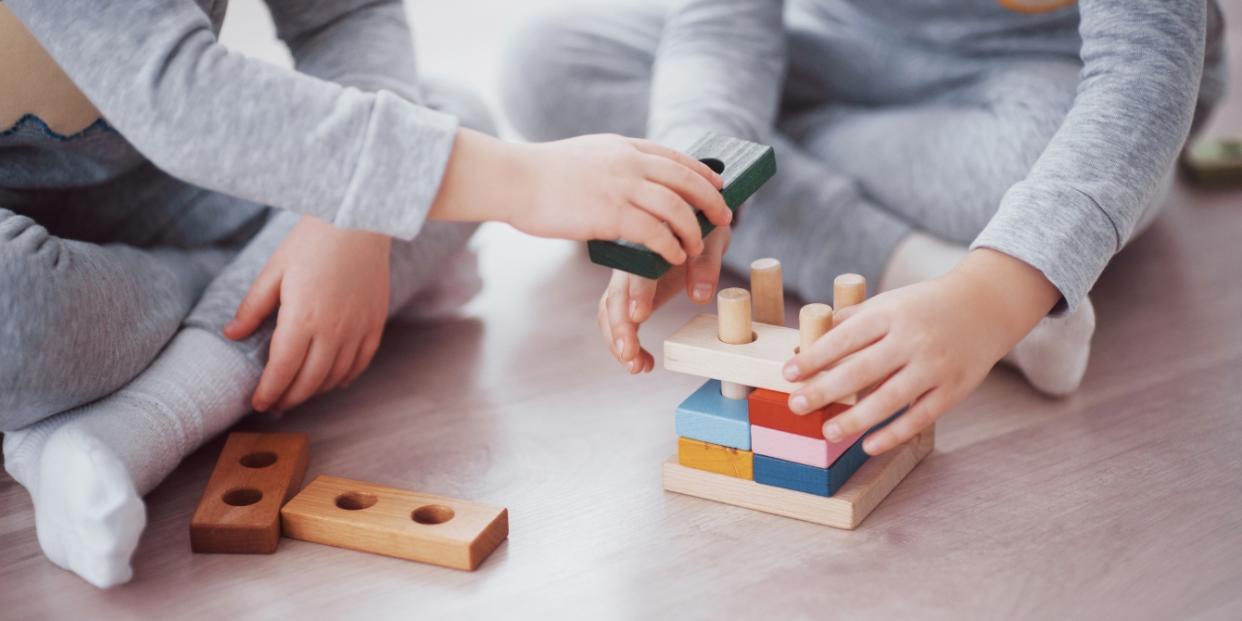Here’s how to actually buy fewer toys this year, according to a sustainability expert

By the age of 13 most American children own 117 toys, but on average kids only play with a maximum of 10 toys regularly. Six out of 10 parents feel overwhelmed by the number of toys in their house. And not only are we purchasing toys at an alarming rate ($4,300 worth before kids become teens), there is also a trash issue. Most toys are destined for the landfill. Seventy-five percent of families get rid of 3 to 14 toys each year. Studies have shown that too many toys can inhibit your child’s cognitive and neurological development. And just as familiarity with toys can lead to boredom and disinterest, so does overabundance.
Trimming your child’s toys and greening playtime is essential for your child’s overall well-being and to ensure the Earth’s health for their future.
Did you know? American kids consume 40% of the world’s toys but make up just 3.1% of the global population of children.
Trim the toys and make play sustainable
Create a toy rotation
Set up a toy shelf and only put out 5 to 10 toys. (Remember, research has shown children only play with 10 at a time, tops). Every few days or once a week, swap out some of the lesser-played-with toys for others that you have stored away—using what you own but limiting how much you put out. Children also get overwhelmed with clutter, so offering them a small but meaningful selection of toys can help your child to immerse themselves in more imaginative play. It also helps them focus while sparking excitement about what they have in front of them.
Use what you have
You do not need to buy a new set of plastic-free toys to make playtime more eco-friendly. As long as the toys you have are safe for your child to use, there is no need to get rid of unsustainable toys if they’re still part of your child’s play.
Set up a toy exchange with a friend
Has your child already done their puzzle 100 times and lost interest? Set up a toy exchange with another family and trade anything from games to trucks. Set a date to swap back, and likely your child will have newfound excitement after having space from some of their toys.
Buy secondhand
Join a Buy Nothing Group to get “new” toys or search for secondhand toys online using resources like eBay, Poshmark, Toycycle, or Mercari. If bringing plastic toys into your child’s play, try to look for secondhand first. A secondhand toy can spark as much joy as a “new” one!
Quality over quantity
Choose heirloom, plastic-free toys that are built to last generations. Be more selective about which toys come into your home, and buy fewer overall. Choose open-ended toys like solid wood blocks, silk scarves, and eco–art supplies, which spark the imagination and can be used in a myriad of ways.
Support sustainable toy brands
If you must buy new, purchase toys made from eco-friendly materials such as sustainably harvested wood, natural rubber, or organic cotton. If they’re made in the USA, even better. Be sure to look for ethical employee and business practices.
Build with nature
Get outside. Use branches to build a fort, rocks, and leaves to make mandalas, or do a nature scavenger hunt at your local park.
Rent
Sign up to rent baby toys, Legos, and more. Be careful to note the difference between toy subscriptions, where they send a new toy every month, and toy rentals, where your child gets a toy every month and then you send it back when they’re done.
Limit packaging
Look for new toys with less packaging, particularly plastic.
Get recharged
If you have battery-powered toys, buy rechargeable batteries instead of disposable ones. This limits resources and waste while keeping kids happy (because a recharge is much quicker than waiting for their parents to run to the store to buy more).
For eco-friendly beach toys, head to the thrift store and buy muffin tins, measuring cups, mixing bowls, and spoons instead of new plastic sand toys.
Excerpted from Mothering Earth. Copyright © 2023 by Julia Rockwell. Used with permission by Charlesbridge Publishing, Inc. 9 Galen Street, Suite 220, Watertown, MA 02472 (617)-926-0329 www.charlesbridge.com

